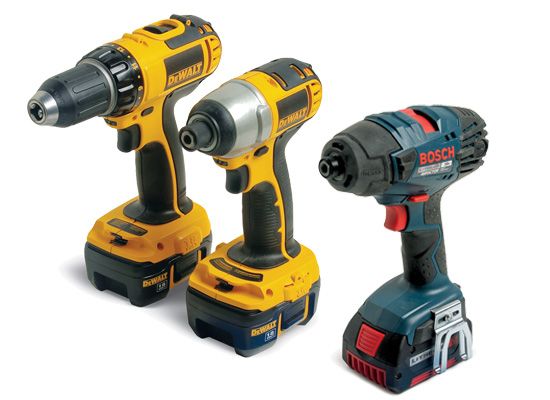
Find out which tool faired better in our review: Bosch's all-in-one 26618, or DeWalts DCK265L combo pack.
Impact drivers are a hot item because they make driving screws almost effortless and their amazing run time means you can work all day without running out of juice. But an impact driver won’t replace your conventional cordless drill. The hex-shanked bit holders don’t accept traditional drill bits without an accessory chuck and the impacting action–which kicks in when the tool encounters sufficient resistance–makes for slow drilling in hardwood. Given these limitations, many power tool manufacturers offer kits that include an impact driver and a cordless drill. Recently, however, engineers have been able to pack driving and drilling modes into a single tool.
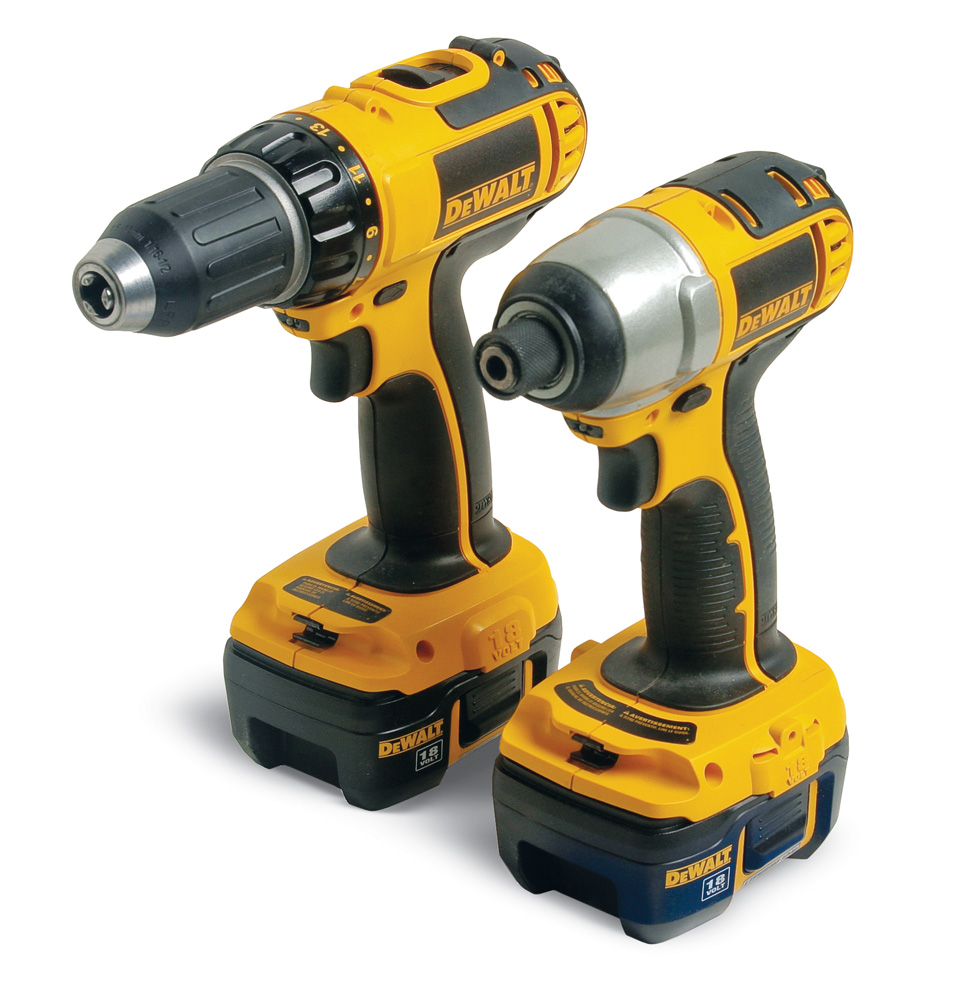 Both DeWalt’s drill and impact driver have compact housings and use 18-volt lithium- ion batteries. |
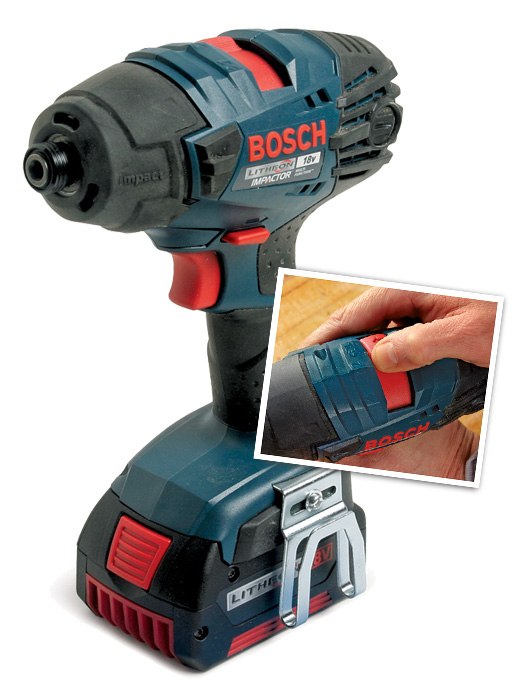 A switch on the top of the Bosch housing allows you to select between one impact mode and two drilling modes. |
To see if these new do-it-all platforms work as well as advertised, we tried the all-in-one Bosch 26618 and compared it to a two-tool kit from DeWalt (DCK265L). Both manufacturers use 18-volt lithium-ion batteries for less weight and longer run times, but the similarity ends there. At 3 lb., the DeWalt impact driver is lighter than most 18-volt drills and its compact housing can fit almost anywhere. Conversely, the 4.3-lb. Bosch is about the same size and weight as a large 18-volt cordless drill. Even though the Bosc performed well in all of our tests, we felt furniture makers would be better served by the DeWalt kit. For starters, you’ll have two tools, so you can use one for pre-drilling and one for driving. YOu’ll also be able to use your existing collection of bits in the DeWalt drill’s standard chuck. And at $280, the DeWalt kit is $110 less than the single Bosch tool. All that said, the Bosch performs well and its do-it-all convenience would likely make it a great tool for home remodeling and repair. For more information, got to dewalt.com or boschtools.com.
| More on drills and drivers: • Drill/impact Driver Kits are a Good Value • Compact 18-Volt Cordless Drills • VIDEO: Testing 18-Volt Cordless Drills |

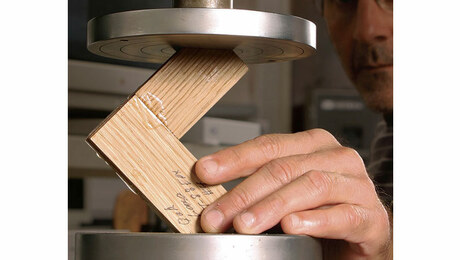

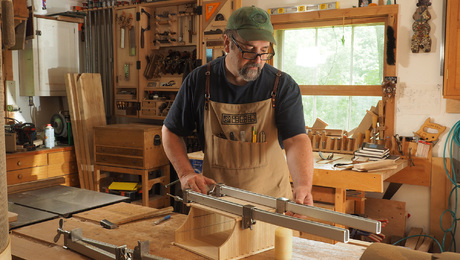
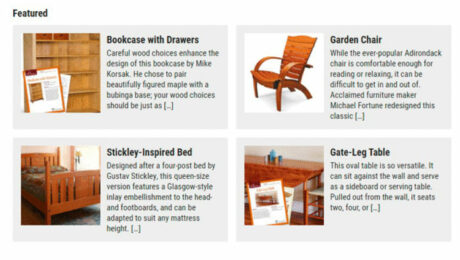


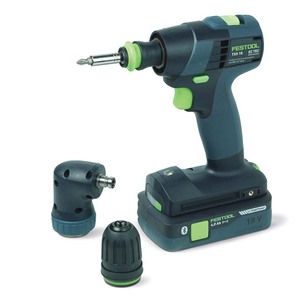
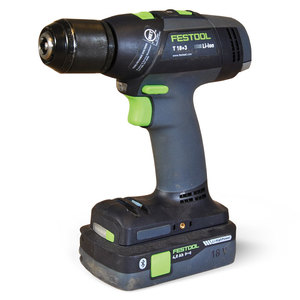
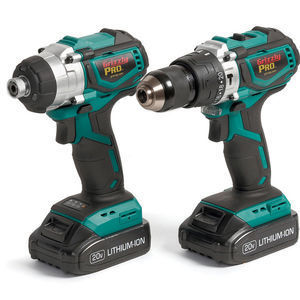
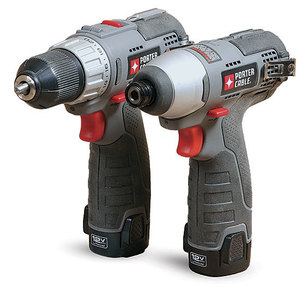












Comments
The 18v drills are great for heavy use but I have a Bosch 12v drill and impact driver. The battery fits in the handle and much lighter and more compact than the 18v models. I find it very handy to use the two tools together - drill pilot holes and drive screws without changing bits. The quick charging and spare battery make continuous use possible so that there is no real advantage to the 18v models unless it is to match other tools owned.
I just completed a new home and when the SIPs crew started driving 10" screws to fasten the SIPs to the oak timbers with impact drivers, all the other carpenters on the crew (and me, the owner/contractor) went out and bought their own impact drivers. They all bought 18v models (mostly DeWalt) to match their other 18v tools. Not having any other cordless tools and being an occasional user I bought the 12v Bosch models for their smaller size.
I couldn't agree more. For brute jobs, it's nice to have the power of an 18v tool, but for most jobs, it is too big, too heavy, and yes, too powerful. I've had my shoulder wrenched several times over the years by "big" tools, and love that my very compact and lightweight 12v LiIon Milwaukee cordless drill is not going to try to rip my shoulder out of its socket... and yet it'll do most everything I demand of it!
So I say, please don't forget to review these mid-range LiIon tools as well as the biggest and meanest.
Bill
For someone interested in the Bosch model mentioned in the article you might also look at the 18-volt two-speed four-function Makita BTP140. It is a hammer-driver type tool with impact, hammer, driver and drill functions all in one. It costs c. $400 at Amazen with battery, charger & case. The bare tool alone, the BTP140Z, without battery, charger or case, is c. $200. The Makita is fairly compact and weighs 3.9 lbs. with battery, according to Makita.
After seeing a review by The Wood Whisperer a while back, I picked up the Dewalt combo to replace my 20 year old 9.6v Makita. I am very glad I did. Both are nice and light in the hand, balanced well and with the 18v Lithium Ion Battery powerful but still small and light. I was originally going to buy a 12v or 14.4v drill but when I picked up the 18v LI version, I was sold. I didn't think I'd ever use an impact driver but once I started using it I love it! I've been using the impact driver to finish the sheet rock in my shop. I expect once the shop is done and I get back to woodworking projects the drill will get the most use.
I've used a DeWalt 14.4 Li-Ion drill for a few years now, and have been very happy with it. When I bought it, and mentioned that I would use it a lot for driving screws, the dealer steered me away from the 18v models, saying that they have a tendency to break screws and twist shoulders, elbows, etc. They are just too powerful for screw-driving. I've been well-satisfied, and with the spare battery, continuous use is not a problem.
But you have gotten me interested in a matching 14.1v impact drill....
-- Mac Campbell
after reading this article I decided on a dewalt 12v impact driver. I love it. It's amazingly light weight especially after using dewalt 18v drill/drivers for years. Yet it will drive anything it's asked. It's noisy when the clutch engages but for a woodworker it's fine. If I was installing a deck, I probably still use my 18v tool, cause the noise would drive me crazy on a sustained basis if driving hundreds of screws. But in the shop for a cabinet project, etc, it's awesome.
Log in or create an account to post a comment.
Sign up Log in